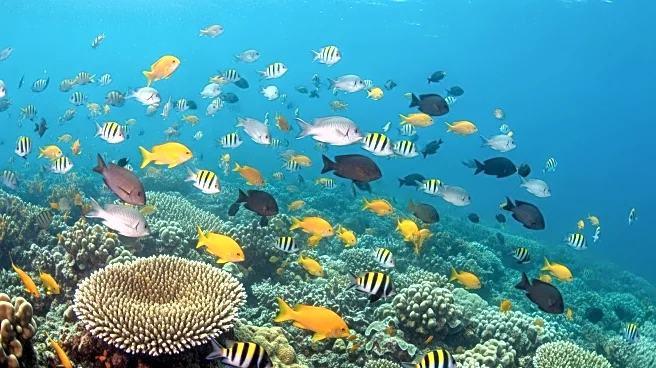What's Happening?
Conservationists have raised alarms over the critical state of the UK's fish stocks, with a significant portion being overexploited. A report by Oceana UK highlights that half of the top ten commercial fish stocks are either at critically low levels or are being overfished, with quotas set above scientific recommendations. The report emphasizes the urgent need for the UK government to align fishing quotas with scientific advice to prevent the collapse of key fish populations. Notably, North Sea cod, Celtic Sea cod, and herring and whiting in the Irish Sea are at critically low levels, yet continue to be fished beyond sustainable limits. The conservation charity has called for a strategic plan to halt overfishing, which they describe as a 'political choice,' to ensure the future of the fishing industry and coastal communities.
Why It's Important?
The overfishing crisis poses a significant threat to the sustainability of the UK's fishing industry and the ecological balance of marine environments. If current practices continue, the collapse of certain fish species could have dire economic consequences for coastal communities reliant on fishing. Sustainable management of fish stocks is crucial for maintaining the industry's viability and protecting marine biodiversity. The report suggests that following scientific advice can lead to recovery, as seen with West of Scotland haddock and North Sea plaice, which have healthy populations due to science-aligned catch limits. The situation underscores the need for policy changes to prioritize long-term ecological and economic health over short-term gains.
What's Next?
The UK government faces pressure to implement a time-bound strategy to address overfishing. This includes setting catch limits in line with scientific recommendations and ending harmful practices like bottom trawling in marine protected areas. The success of such measures could serve as a model for sustainable fisheries management, potentially influencing policies in other regions facing similar challenges. Stakeholders, including environmental groups and the fishing industry, are likely to engage in discussions to balance ecological sustainability with economic interests.
Beyond the Headlines
The issue of overfishing extends beyond immediate economic impacts, touching on ethical considerations regarding environmental stewardship and the responsibility to future generations. The political dimension of setting fishing quotas highlights the complex interplay between science, policy, and industry interests. Long-term, the adoption of sustainable fishing practices could lead to a cultural shift in how marine resources are valued and managed, promoting a more harmonious relationship between human activity and natural ecosystems.








